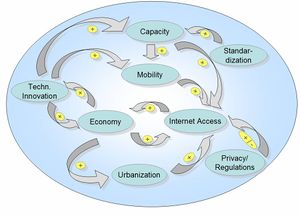A world of challenges
The main driving forces for the Internet in 2015 are the economy, access to Internet, technological innovation, capacity, mobility, standardization, privacy and regulations as well as urbanization. As a result from the interplay of the driving forces the story for the Internet in 2015 developed as follows:
In the coming years to 2015 technological innovation will lead to new equipment and devices that will be used for connecting to a global web. We will have wireless connectivity nearly everywhere (at least in the so called developed world). We will have a combined TV-entertainment-Internet device at home and a mobile device to perform email as well as phone and other PDA functionalities (similar to a Blackberry but more advanced) to take with us during the time we are not at home or in the office. The mobile device is of course well-suited with devices we use in private or office life - standardization and compatibility are common in 2015.
The offered services on the Internet will be characterized by customer-orientation, high performance and a pay-per-access price structure. Entertainment and information service providers have converged and offer a broad range of Internet services that can be accessed mobile.
The global range of the Internet will increase until 2015. The trend for urbanization will increase the number of people with access to the web. Nevertheless, the ones left behind will suffer even a stronger disadvantage than today, as technology in general will play a determining role in our personal as well as our business lives. The part of a society that has access to Internet and technology first will form a kind of knowledge elite and benefit most from their leading position. The global economy will further grow until 2015. The growth will be driven by political pres-sures for higher living standards, improved economic policies, rising foreign trade and in-vestment as well as the broader access to technology. On the other hand, regions, countries and groups feeling left behind will face increasing economic stagnation, political instability and cultural alienation. This will lead to political, ethnic, ideological and religious extremism, which will likely result in violence.
By 2015 India will further pursue intellectual leadership in the areas Internet and technology and serve as a “brain-pool” in application development. China will lead the emerging countries in using the Internet especially in its growing urban areas. Beijing's current power to con-trol the Internet will diminish until 2015 as the importance of information for economical de-velopment will stay crucial.
The issue of privacy will still be not solved by 2015. The split in groups pursuing the access to the Internet and preaching the benefits will still be present as well as the anti-globalization groups that value the Internet as a threat to privacy, cultural diversity and personal freedom. Governments will be in the ambiguous role to support the economical benefits of the Internet as well as to safe privacy rights.
-Ute Stahl-
